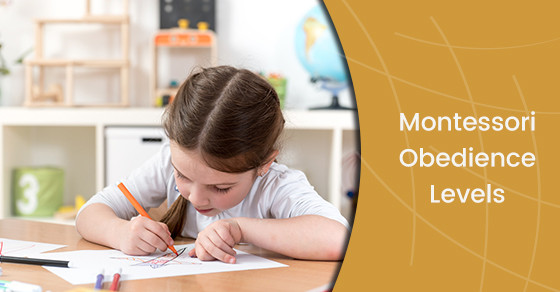What Are The Montessori Levels Of Obedience?
According to Maria Montessori, children develop obedience and self-discipline in three stages. In short, obedience is a developmental process that is improved upon with practice.
Self-discipline is all about exerting control over one’s behaviour in light of temptations. In the beginning, children are unable to grasp the importance of doing what is asked. Eventually, however, they realize the importance and value of doing so.
The Montessori Levels of Obedience
- The First Level
The first level is typically observed in children under three years old, but older children can also exhibit this level of obedience as well. During the first level, children are capable of obeying, but not always -- typically, if the task is in line with what the child wants to do, he or she will obey.However, there are times when they are simply unable to listen to instructions. The reason for this is that the child is so enraptured by discovering the world around him or her that the child simply cannot pay attention. They are just unable to see the reason for doing what is required of them.
- The Second Level
During the second level, self-discipline appears -- children can obey. There are no obstacles caused by a lack of control. Children will simply listen and fulfill what is asked of them. They begin to take responsibility for their own actions. However, obedience during this level is called “blind obedience.” This means that the obedience is dependent upon adults and other authority figures, not the child’s own will. Many adults will mistake this as the highest level of obedience, but because the obedience does not come from within, it is not true obedience. This is what ultimately separates the second level of obedience and the third level, as you will see below. - The Third Level
The third and highest level of obedience is referred to as “joyful obedience.” At this level, a child will not only complete what is asked of him or her but also understand the value of doing so. They will do so whether or not an adult is present. Not only do children realize the value of being obedient, but Montessori says that the child will find happiness in doing so as well.
The Montessori teacher approaches misbehaviour differently. They approach it from the perspective of a child’s obedience level, considering the child’s ability to obey or not.
Thinkamajigs offers high-quality, value-priced Montessori classroom packages, teaching materials, educational toys, games, puzzles and more, all of which you can view in our catalog here. We ship anywhere in North America. Contact us for more information.
LATEST BLOG POSTS
How To Set Up A Montessori Environment At Home
Creating a Montessori-inspired environment at home provides the opportunity to support your child's...
Montessori & Technology: do they play well together?
Dr. Maria Montessori’s method of teaching children emphasizes the use of concrete materials and hand...
Froebel Gifts: An Introduction
You may have heard of Fröebel Gifts (we carry the full selection here), but you may also wonder what...
Safe Toys for Toddlers: What Parents Should Know
As a parent, you want to be sure that any toys your toddler plays with are safe and age-appropriate....
Infant & Toddler Toy Guide - Part 2
THINKAMAJIGS’ GUIDE TO CHOOSING EDUCATIONAL TOYS FROM BIRTH TO AGE 3PART 2: AGE-RELATED DEVELOPMENTA...
Infant & Toddler Toy Guide - Part 1
THINKAMAJIGS’ GUIDE TO CHOOSING EDUCATIONAL TOYS FROM BIRTH TO AGE 3PART 1: SKILLS DEVELOPMENT“What...







